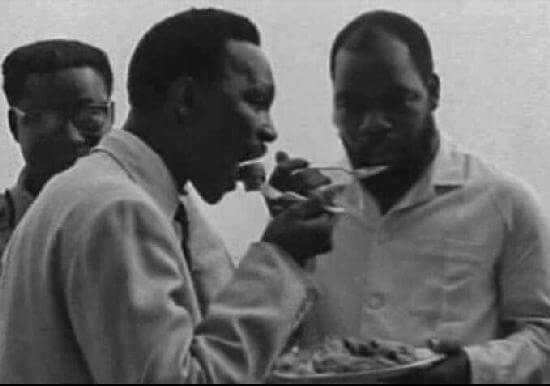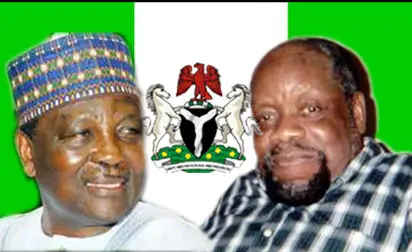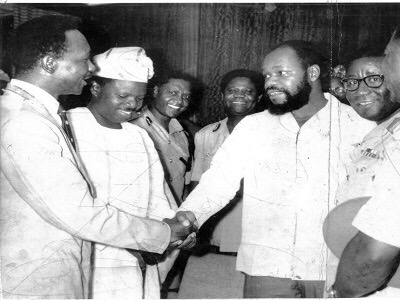Aburi Accord and Nigeria of our dream

- Gowon and Ojukwu sharing a meal in Aburi
By Emma Nwosu
Yoruba leaders deserve the gold medal for perspicacity and consistency in advocating for devolution of powers to federating units, based on regional and ethnic affiliation, since the days of the inimitable Chief Obafemi Awolowo. The advertorial of the Council of Yoruba Elders (CYE) in the Tribune of May 19, 2024, with special reference to the composition of the Yoruba nation, falls squarely in that space.
Nigeria is an agglomeration of nationalities with strong historical and cultural bonds. At the corporate level, most Nigerians are more patriotic to their ethnic nationality than to the country. No sincere effort has been made to change this mentality which is rather worsened by orchestrated geopolitical imbalances and decadent Constitutional, resource and religious manoeuvres.
Therefore, we should stop living in denial and face the reality that, given the range of mismanaged diversity, Nigeria can never achieve peace and inclusive growth and development as a unitary federation. Overwhelmed by centrifugal forces, it has failed to achieve simple self-sufficiency in anything, more than 60 years after independence, not to talk of the larger mission of emancipating Africa and the entire black race, despite God bestowing on it everything (from a large population to an awesome range of natural resources) to become one of the greatest nations on earth.
Since patriotism is imperative to corporate prosperity, let’s utilize it where it resides and then propagate a national worldview, equal and fluid citizenship, healthy competition and merit and sense of brotherhood and respect for citizens who are bound to repay the state with patriotism – in the same manner that they cherish and serve their communities, social clubs and professional and religious associations.
Therefore, let Nigeria be unbundled now to unleash the capacities of its nationalities which are bound to look inwards to comparative advantages for self-actualization and, together, propel the country into rapid development, similar to the performance of the semi-independent regions of the First Republic when the Western Region and the Eastern Region were rated among the fastest-growing economies in the world. But for protracted political crisis in the Western Region, coupled with perennial ethnic and religious pogroms in the Northern Region, which triggered military intervention in January 1966, Nigeria would have been propelled into the league of the world’s leading economies by the fiercely competing regions. Similarly, we unite and somewhat hold our own in the comity of nations when it comes to sports due to the infallible attributes of equal opportunity, healthy competition and merit.
Regretfully, in its pertinent proposals in this regard, the CYE forgot the most far-reaching document for the unbundling and leveling project which is the Aburi Accord. The National Assembly should not make the same mistake in the purported bill for a return to regionalism which bill is welcome.
READ ALSO: President Bola Tinubu: To be or not to be?
A conference was held in Aburi, Ghana, in January 1967, where General Yakubu Gowon (leading the delegation of the Federal Government of Nigeria) and Lieutenant-Colonel Chukwuemeka Odumegwu Ojukwu (leading the delegation of the Government of the Eastern Region) reached an agreement capable of salvaging and repositioning the country from the precipice, in the aftermath of the January 1966 coup d’etat and the counter coup of July 1966 and, most of all, the genocide against people of the Eastern Region in the North and their elite military officers in Lagos and Abeokuta, in the West.

- Gowon and Ojukwu
That Agreement, named Aburi Accord, provided for a thoroughly unbundled federation in which the regions would control their internal security and natural resources, with several prudential guidelines for the relationship of the central government with the regions aimed at enhanced autonomy and diversified development which would definitely aggregate to the corporate prosperity of Nigeria. It was the repudiation of that accord by General Yakubu Gowon, upon return to Nigeria, that triggered the series of events which led to the Civil War, balkanization and all our travails till today.
Details of the Accord are on the internet and need not be recast here. With little modification, it addresses most of the current concerns of Nigerians (such as internal security and State Police). Only the 1963 Constitution comes close to the Aburi Accord for the regeneration of Nigeria.
It is with circumspection and a bit of regret that I had to record this conviction as a senior citizen who has monitored the country’s politics all my adult life and who has lived and worked in both the public sector and the private sector in the East, the North and the West and, in particular, among the Fulani, the Igbo and the Yoruba (considered major protagonists) for, at least, a decade in each case. I found favour among the people everywhere and can testify that Nigeria’s problem is not at the interpersonal level. We trade, intermarry and do everything together, heartily, but change like chameleon and lose our senses once corporate power, religion or office is at stake.
The primary source of this centrifugal affliction is the ambition of one section to subjugate the rest (which had led to Civil War and is still raging) and the fact that both the Constitution and political office have been fashioned as instruments-at-large for undue advantage and oppression of others by those in power. For Nigeria to advance, the structural imbalance between the North and the South and within states and regions and the rascality of our leaders must be dealt with by Constitution and subsidiary laws.
For instance, from four vibrant, semi-autonomous regions of the First Republic we now have a unitary federation of 36 vassal states. Nineteen of these vassals (plus the Federal Capital Territory) were created in the Northern Region while only 17 were created in the three Southern Regions combined. Also, essential powers and resources were confiscated from states by the Federal Government. Merit was substituted with quota and patronage – at the expense of healthy competition and equal citizenship. At the same time, birth control has taken hold of Southern Nigeria while the Moslem North is still procreating in geometrical progression, with implications for putative voting population and political and religious control into the future.
This redesign of Nigeria into a lopsided unitary federation (sealed by Decree 24 as the 1999 Constitution) by the Northern Military Establishment (which ruled by coups and Decrees, for most of the 33 years between 1966 and 1999) is, obviously, for the Northern Region to gain the lion share of public revenues and the control of the Executive, Legislative and Judicial arms of government as well as the Armed Forces and the Police. It is on the basis of this stranglehold that members of the Northern establishment often threaten that whoever else might be in office must take their dictation as custodians of power or face political consequences! And, indeed, it was by default, accident or compromise with the Moslem North that three Southerners out of 16 Presidents – Distinguished Chief Olusegun Obasanjo, Dr. Goodluck Jonathan and Asiwaju Bola Tinubu – ever became President of Nigeria. The playing field needs to be leveled!
Perhaps, unexpected by the strategists, the aftermath of this redesign has been generalized laxity, abdication of duty and diversion of wits by our leaders from comparative advantages and local sources of revenue to scheming for larger shares of crude oil revenues without sweat, drastic decline in domestic production, import-dependency, persistently deteriorating inflation rate and exchange rate, unemployment and unbridled corruption and looting of public resources, capped by pervasive macro-economic instability and insecurity. The same North is worst hit.
There is no indication that Nigeria would ever become united and prosperous without discarding the current predatory system (which has spared neither the North nor the South) for the nationalities to breathe – provided they can start on a template devoid of such aberrations as money and thuggery politics, godfatherism, state capture, misallocation and looting of resources, supremacy and entitlement mentality and skewed compensation (the remuneration of a senator should not be more than that of a consultant physician, for example, given the job descriptions and specifications)
Under the Aburi Accord, a semi-independent Yoruba region or Igbo region would be as large as the European powers such as Britain, France and Germany and, in no time, a match, economically. Otherwise, Nigeria’s march to perdition will be irreversible. In addition to the stranglehold of geopolitical imbalances and the 1999 Constitution, state institutions – from the executive to the legislature and the judiciary – are utterly corrupt, weak and complicit with the predators in power, leaving the people disconsolate and powerless, without any fallback against their oppressors. But something is bound to give.
Second, merit and competition, which facilitate social mobility and societal renewal, are gone. You can no longer secure a place in public institutions without the endorsement of prominent political office holders or senior public servants who fill everywhere with their over-pampered children, relatives and friends, at the expense of hungry, achievement-motivated people of grit and passion. Yet, without an open system where the child of ‘nobody’ can become ‘somebody’ – even the Head of State – by merit and healthy competition (like Barrack Obama) there can be no patriotism, regeneration or development.
Third, elections are like wars in which the umpire and the judiciary, in particular and the law enforcement agencies, in general – instead of standing with the people – align with the political class in the subversion of the electoral process, to the extent of defying the Constitution, technological innovations and other measures meant to minimize manipulation. Election is now a game for moneybags and gangsters and can never be free, fair and credible again, which means that Nigerian democracy is doomed as it is neither determined by the people nor centred on them but just a criminal enterprise by state captors.
Fourth, there can never be care or respect for the people or good governance wherever politicians can bulldoze to power. Thus, while Nigeria is facing extreme negative cashflows, the Federal Government and most state governments are still misallocating resources, living in opulence and issuing policies and embarking on white elephant projects at the expense of the people’s welfare – operating as if a problem does not exist! Unless the country is reconstructed now, to empower the nationalities, the youths and future generations would soon have no country to look forward to! Or, where else is the hope?




